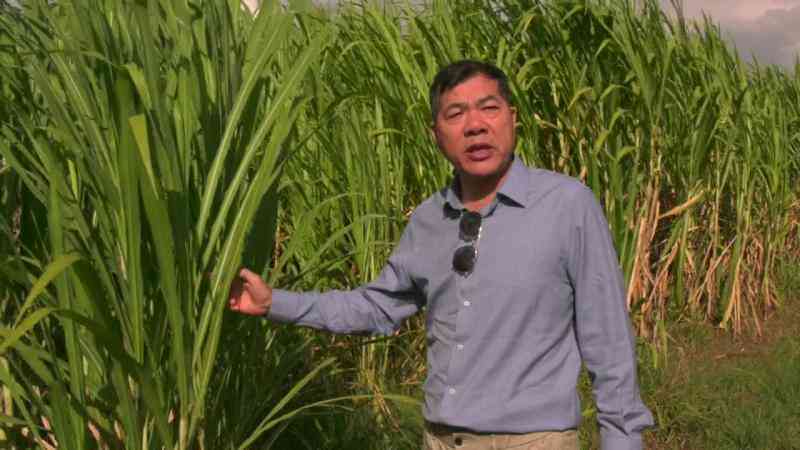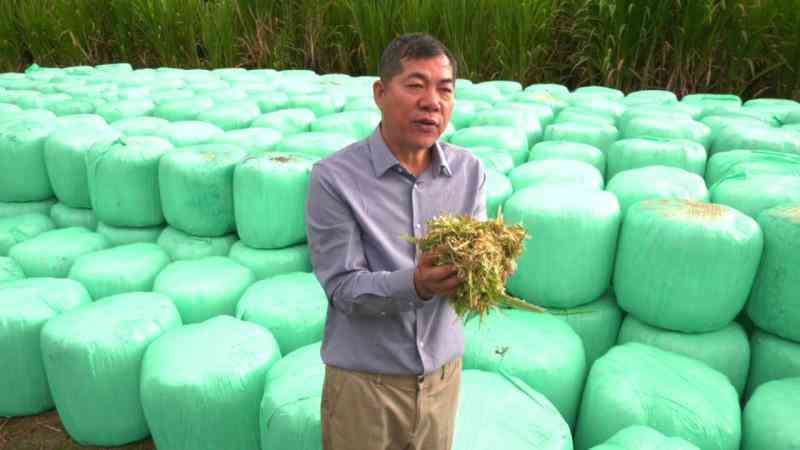
Jack Liu at his Juncao grass farm in Rongai, Nakuru County. [Kennedy Gachuhi, Standard]
Jack Liu, a Chinese investor in Kenya, is on a mission to end the fodder shortage in the country and increase milk yields for dairy farmers.
To achieve this, he is planting and promoting Juncao grass, commonly called Chinese magic grass.
The Juncao grass technology originates from China, and Kenya is now among the 108 countries with the grass species thanks to Liu, who introduced it in 2021.
The word juncao in Chinese has two meanings: jun (fungi) and Cao (grass).
In May 2022, he leased 50 acres of land in Kambi Ya Moto Area in Rongai Constituency in Nakuru County, where he planted the grass and started harvesting it for the first time.
The farm has now become a demo and learning site where companies, organisations, and institutions are coming to learn about the grass.
According to the Kenya Agriculture and Livestock Research Organisation (KALRO), only 10 per cent of farming is devoted to fodder cultivation in Kenya, leading to a fodder shortage. Another concern is the unavailability of good-quality fodder seeds.
Data from the National Drought Management Authority (NDMA) indicates that the country lost over three million herds of cattle due to the prolonged drought in arid and semi-arid counties.
The situation was so dire that the national and county governments in affected regions had to intervene by providing free pasture, whose availability was also a challenge.
''It is this gap that I saw as good to venture into animal feeds. The recent drought situation has affected the majority of Arid and Semi-Arid Areas (ASALs), where many pastoralists have lost their livestock,'' said Liu, CEO of Crevation International Ltd.
''When the grass is ready for harvest, processing, and packaging as silage, it would come in handy to save the situation since it can be reserved for two to three years when packaged,'' he added during a visit to the farm recently.
It's not just drought that the grass intends to save, but also help improve milk production for dairy farmers.

Jack Liu displays some of the silage made from Juncao grass at his farm in Rongai, Nakuru County. [Kennedy Gachuhi, Standard]
According to Liu, the grass, which is locally called ''Chinese magic grass'', can increase milk production by 50 per cent thanks to its high protein content and reduce the dairy costs at processing and packaging as silage.'' said Liu.
The grass, he said, has 18.6 per cent crude protein content, taking the second position after Lucerne, which has 22 per cent, Napier at 10.8, maize leaves at 8 per cent and Boma Rhodes Hay at 2 per cent.
Liu says that though only a few farmers in the country engage in commercial fodder production, he is not worried about his investment, exuding confidence that he will find clients to offtake his harvest.
It can be used as a substrate for growing mushrooms, among its many other functions, including feeds for chicken, and fish depending on the sizes in the crushing process.
Per acre, he said one can harvest between 150 and 180 tonnes in cases where water and manure are sufficiently supplied, and it can be harvested once every two months, meaning six times a year.
One acre of Juncao Grass can feed 20 cows or 200 goats.
''It has a 25-year lifespan before it is uprooted and new stems planted,'' he said.
For a 50- to 60-kg bale of silage, which he says can be stored for up to three years, Liu says he has set the price at Sh1,000 each.
Unlike other grass species, Juncao grass depends on both rain and irrigation, and it can grow even in the ASAL areas so long as water irrigation is in place, thus ensuring continued harvest even during dry seasons.
The roots, he said, penetrate the soil deeply, about 2 metres, thus making their growth sustainable since they use underground humidity and also sustain water in the roots.
''It's this advantage that the company has already introduced the grass into some ASAL and non-ASAL counties, including Turkana, Wajir, Kajiado, Kitui, Kakamega, Bungoma, Makueni, and others where we are planning to grow the grass,'' said Liu.
The investor also plans to introduce the grass to the other 24 counties that have recently witnessed the worst drought.
He explains that Juncao grass will also go a long way in contributing to the country's food security as a substitute for silage made from green maize.
"Some farmers have been growing maize and harvesting it prematurely for silage production, yet food production is still low. If fodder production is embraced, conflict between farmers and herders will be a thing of the past," he said.
The grass has no seeds or flowers and is free from pests and any other infections, unlike Napier grass. It was approved by Kenya Plant Health and Inspectorate Services (KEPHIS) after being quarantined for over eight months.
He said the company will sell the processed grass in silage at 50 per cent less than the market price of existing grass varieties like Boma Rhodes. Also, stems will be provided to farmers at discounted prices.
According to Liu, Juncao grass will help cope with the effects of climate change due to its sustainability, replicability, scaleability, and affordability.
The Department of Economic and Social Development is promoting grass all over the world as part of a project to increase smallholder farmers' ability to practise sustainable agriculture in developing nations.
The United Nations Peace and Development Trust Fund's 2030 Agenda for Sustainable Development Sub-Fund is in support of it.
The four-year project is entitled Strengthening the capacity of developing countries to achieve sustainable agriculture through the transfer of Juncao technology, analysing and disseminating best practises and lessons learned for alleviating poverty, and promoting productive employment".
Four countries are already participating in the four-year project, including Nepal, Nigeria, Tanzania, and Zimbabwe, with additional expressions of interest already having been received.
The Fujian Agriculture and Forestry University (FAFU) is the project's implementing partner.
According to Dr Harun Maina, a farmer in Njoro near Egerton University who owns Wilda Farm with 40 dairy cows and has been using the grass since April this year, he has received much praise for its benefits.
''We have been buying the grass in cut stems, and we have seen great benefits. One thing we have noticed is a tremendous reduction in concentrates, so we do not feed our animals a lot of concentrates. When you substitute the concentrates, the impact is not felt since the production of milk is sustained,'' said Dr Maina.
He added: ''When feeding heifers, we have witnessed healthy growth, and thus we do not have to feed them with high-cost intensive feeds for them to maintain a high growth rate.''
There are two major categories of feeds: concentrates (grains) and roughages (pasture, hay, and silage). Roughages are usually high in fibre. Concentrates are usually high in protein or carbohydrates.
Dr Maina says he also started planting Juncao grass and is now multiplying it by selling it to farmers.
 The Standard Group Plc is a multi-media organization with investments in media
platforms spanning newspaper print
operations, television, radio broadcasting, digital and online services. The
Standard Group is recognized as a
leading multi-media house in Kenya with a key influence in matters of national and
international interest.
The Standard Group Plc is a multi-media organization with investments in media
platforms spanning newspaper print
operations, television, radio broadcasting, digital and online services. The
Standard Group is recognized as a
leading multi-media house in Kenya with a key influence in matters of national and
international interest.
